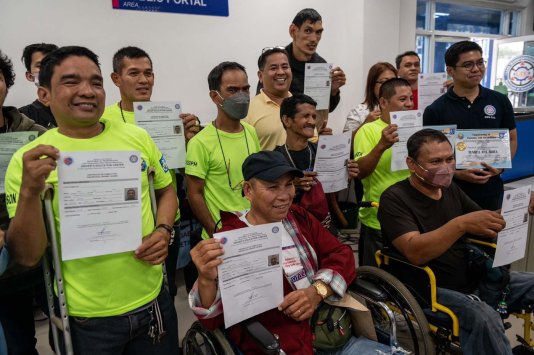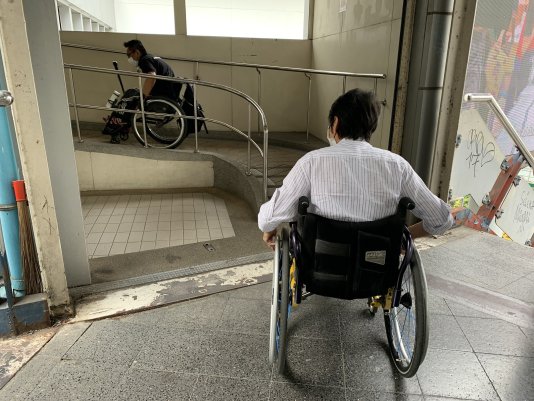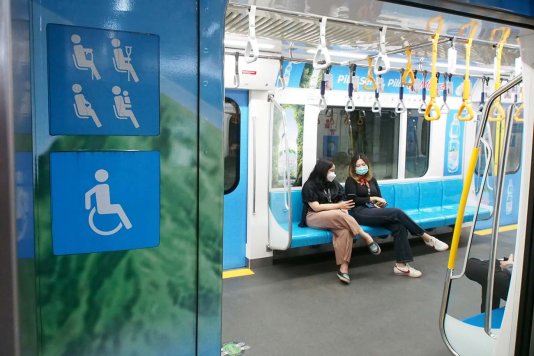- About
- Topics
- Picks
- Audio
- Story
- In-Depth
- Opinion
- News
- Donate
-
Signup for our newsletterOur Editors' Best Picks.Send
Read, Debate: Engage.
| March 04, 2023 | |
|---|---|
| topic: | Discrimination |
| tags: | #Indonesia, #Philippines, #Thailand, #disabilities, #accessibility |
| located: | Indonesia, Philippines, Thailand |
| by: | Leo Galuh, Lisa Marie David, Sirinya Wattanasukchai |
Riza Supangan, a hearing-impaired homemaker who lives in the Philippines' Rizal province with her husband - who is also hearing-impaired, embarked on a long, 50 kilometre journey from her home to the capital Manila with the hope of changing her life.
"My driver’s license application has been rejected twice, that is why I want to know more about this organisation," Supangan told FairPlanet with the help of a sign language translator.
She went inside the office of Alyansa ng mga May Kapansanan na Nagmamaneho ng Sasakyan at the Motor Sa Pilipinas (ALKASAMOPI) along with 20 other hearing-impaired individuals for a training session. Giggles and laughter flew around the room.
Manila’s public transportation system ranks among the worst in the recent 2022 Urban Mobility Readiness Index, at 56th out of 60 cities worldwide. The neighbouring megacities of Jakarta and Bangkok rank 38th and 39th, respectively.
"We call the government to give attention to the accessibility of transportation for PWD and give concern to PWD commuters," Joseph Delgado, founder of ALKASAMOPI, told FairPlanet. He added that disability is not the problem, but rather accessibility.
ALKASAMOPI, a (PWD) driver association for people with disabilities that advocates for safe and accessible roads, came up with the blueprint and design for the PWD-friendly tricycles, and aims to encourage road safety for PWDs and help them obtain driver’s licenses.
In 2018, Delgado established ALKASAMOPI in order to conduct trainings and programmes nationwide to assist PWDs. Although Delgado has no disability, he was raised in a facility catering to those with mobility impairment. The organisation has supported his family, since his father sustained a spine injury in an accident and has to use a wheelchair.
As of January 2023, ALKASAMOPI has 527 members and have provided free Theoretical Driving Courses (TDC) to nearly 230 individuals and with both hearing and orthopaedic disabilities.
Delgado believes that inaccessible public transport hampers PWDs access to work and other opportunities. The lack of alternatives pushed many PWDs to find their own way out, he added.
"Instead of squeezing themselves in a jeepney, bus, or other public transport, they make their own way to have their own vehicles, have their own licenses to be able to work properly," Delgado told FairPlanet.
Commuting in Metro Manila has always been a challenge to its 13 million individuals. Congestion, disorganised terminals, and a lack of interconnecting routes and transport options force commuters to be a fighter in the street. Rush hours and heavy rains make commuting even harder.
These situations completely disadvantage PWDs in Metro Manila.
Meanwhile, in neighbouring Bangkok, Thailand, Manit Intharapimm founder of Accessibility is Freedom, conducted a social experiment intended to demonstrate the challenges and unequal treatment PWDs endure on a daily basis.
Moving from a train station without a lift to a building with an entrance without a ramp, and from an overly low train platform to uneven pavements, wheelchair-bound Intharapim realised that there is no feasible way for PWDs to commute in the city.
"A city should be inclusive where people with reduced abilities could live like everyone else," Intharapim told FairPlanet.
In Thailand, PWDs are provided some assistance in public transportation systems. In Bangkok, for example, people with disabilities are given free rides after they register at the sales ticket booth, while the visually-impaired are led individually by the staff to the platform.
Intharapim said that he has been working with Accessibility is Freedom for over a decade in order to campaign for equality. His movement offered a free service to help with the design and also inspect a train station after construction to determine whether it is practical enough for PWDs.
He has been known for using brute force to voice his concerns.
In 2018, his name appeared on the media platform Coconuts after he smashed the elevator glass door at a Bangkok Transit System (BTS) station. This came after he was asked to sign a request form just to use the lift in the station.
"We are more than willing to pay for each ride like everyone else, but that means we need to be provided the same service," Intharapim said.
He added that filling out a free ride form by PWD commuters violates their rights and discriminates against them. "All we need is to be included, not a 'special' treatment that makes us different."
As of 2021, there are approximately 2.1 million PWDs living in Thailand, 100,000 of which live in Bangkok, according to the report of Sustainable Urban Transport Index for Bangkok and Impacts of COVID-19 on Mobility. Among them, over half have physical disabilities, 400,000 have hearing impairment and 190,000 have visual impairment. The rest suffer from mental disabilities, and are unlikely to commute by themselves.
Nonetheless, the roughly 1.5 million PWDs who commute have been excluded from most infrastructure design.
The Thailand Tourism Authority clearly concedes that "Thailand is not easy place for with physical challenges," and that city trains were not designed to be inclusive enough.
"The streets and pavements are uneven, and few buildings provide ramps and handrails to aid disabled access," the agency's release states, adding that efforts have been made to make public transport more accessible.
Intharapim started offering university students, from architecture to arts, a special class about the reality of PWDs living in a city that was not designed for all of its residents. Sanchai Santiwes, associate professor at the faculty of architecture at Khon Kaen University, is on the same page with Intharapim.
Santiwes was impressed by a workshop conducted by the Asia-Pacific Development Center on Disability over a decade ago, and launched an elective course titled Universal Design, in which students are given first-hand experience in commuting as a PWD.
The course aims to remind them that functions matter as much as forms and that small but crucial details are often overlooked. He said that many designers and developers disregard the impractical steepness of a ramp or forget that a staircase has not been design with inclusivity in mind.
"Able-bodied people often sympathise with PWDs and feel they should be offered extra care," Santiwes told FairPlanet. "But in fact, inclusive design is a solution that allows everyone, both the abled-bodied and people with disabilities, to be able to live together equally,"
He always reminds his students and those involved with infrastructure design and building that one doesn’t need to get old to require the use of these inclusive facilities, as one can always become temporarily disabled any time due to an accident.
Yudha Hadryan, a 28 year-old hearing-impaired Starbucks Coffee barista from Jakarta, Indonesia, served a grande-sized glass of Caramel Macchiato for FairPlanet's correspondent, before sharing his commuting experience in the city.
He has been working in the first Starbucks Coffee Signing Store in Indonesia for three months. For Hadryan, commuting from home to the store is pretty tough, as needs an hour to travel 33 kilometres from home to the workplace.
"First I take e-ride hailing Gojek, then I take Jakarta commuter line, and needs two-time transits," Hadryan told FairPlanet in writing.
He added that he always types on his smartphone to communicate with the TransJakarta officers, noting that for individuals like him, a sign board that shows the routes in every bus stop is necessary.
According to an International Labour Organization (ILO) report published in February last year, only about 7 million of 17.95 million working-age people with disabilities in Indonesia - less than 40 percent - are employed in the formal sector.
The ILO notes that Indonesian regulation has allocated a quota of two percent for government’s institutions and state-owned companies, as well as a quota of one percent for commercial companies. More than 500 companies have employed more than 4,500 workers with disabilities, the ILO states, citing the Manpower Ministry.
But although the current employer provides this opportunity for Hadryan, he still requires government involvement to enjoy genuine accessibility in Jakarta.
"I think we need a clear information sign board, so that it will make PWDs’ life easier," Hadryan said.
Not far from the Starbucks Coffee Signing Store is one of the city’s Mass Rapid Jakarta (MRT) stations. The subway service was launched in March 2019, and has since shown some improvement by being integrated with other public transportations such as TransJakarta Bus Station.
MRT Jakarta's corporate secretary division head, Ahmad Pratomo, said that the Jakarta government-owned train provider company introduced an innovation that will help its PWDs passengers.
"We launched Digital Intelligent Assistant (DINA) in 2022," Pratomo told FairPlanet. Through the digital assistant, he said, PWDs can interact with MRT Jakarta officers by making video calls and chats.
Additionally, PWDs can read questions on the digital board that cater to hearing-impaired individuals or people using a wheelchair, while the visually-impaired can communicate using braille letters on the board.
Pratomo also said that MRT Jakarta provides additional features to assist PWDs, both at train stations and inside the train cars.
"We provide tactile block for the visual-impaired person, PWD toilets, braille letters in the lift, and even portable ramps," Pratomo explained.
As a member of a transportation company, Pratomo believes that inclusive access plays a key role in encouraging people to use public transportation.
However, Hadryan, who had tried using MRT Jakarta several times, suggested that the company's technology should be integrated with other public transportations in Jakarta, such as TransJakarta bus stations.
He said that the local MRT Jakarta station is a bit far from his working place, which requires him to walk little longer. He expected the MRT Jakarta would provide some shed, so that all passengers, including PWDs, could be sheltered from the elements.
Hadryan said he needs to get used to the available transportation options in Jakarta. And while it isn't yet integrated for accommodation of PWDs, he decided to opt for the TransJakarta bus, as his main public transportation.
From a total of 13 MRT Jakarta stations, four have been integrated with TransJakarta bus stations, according to MRT Jakarta's integrated map. Commenting on the 2019 launch, Pratomo said that the company invited some PWDs to engage in the construction process, as MRT Jakarta was seeking some feedback from PWD communities on its accessibility features.
"It is not only complied with the regulation regarding PWD, but we want to listen from them and evaluate some minor gap," he noted.
The company collaborates with several organisations assisting PWDs to provide trainings for MRT Jakarta officers, according to Pratomo. These trainings are necessary in order for officers to gain an insight into the perspective of PWDs, which would impact the manner in which they assist them, he added.
Image by Tichakorn Boonpua.
By copying the embed code below, you agree to adhere to our republishing guidelines.



